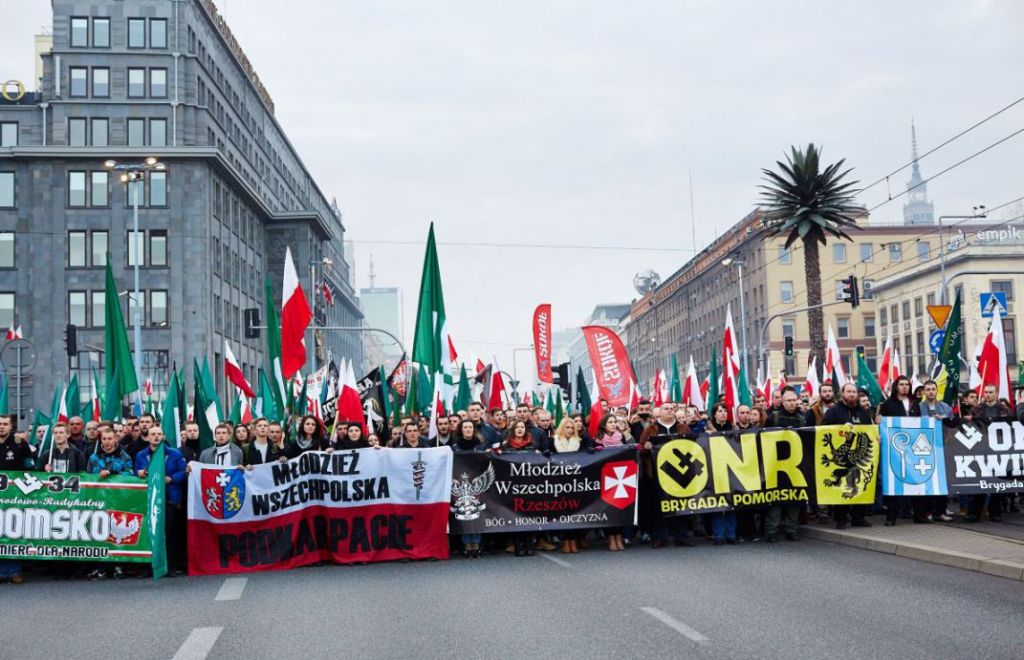Since entering office last November, the national-conservative Law and Justice (PiS) party has embarked on a frantic drive to overhaul Poland’s institutions. It explicitly aims not just to reform, but to restructure entirely the state that emerged following the collapse of the communist regime in 1989. This system, PiS’s leaders claim, did not bring the country true independence, but rather erected a façade of freedom behind which the former communist elites remained in power, continuing to exert enormous influence over the country’s politics, economy and media.
Yet lacking the necessary two-thirds majority to enact its desired constitutional change, the party has instead sought to use all means at its disposal to undermine or circumvent the established order. Most notably, the constitutional court has been effectively rendered inoperative, while further reforms have been made to public media, the civil service, the prosecutor’s office, the police and other elements of the state apparatus, together consolidating unprecedented power in the hands of the government and weakening the system of checks and balances necessary to prevent its abuse. While this is concerning enough in its own right, perhaps the greatest danger lies not in how PiS may exploit the situation in the near term, but how it could be abused by a future, more extreme government. Adding to this concern is the fact that PiS’s own actions since coming to power make such a shift more likely, either through a coalition involving the far right or because PiS itself may drift in that direction.
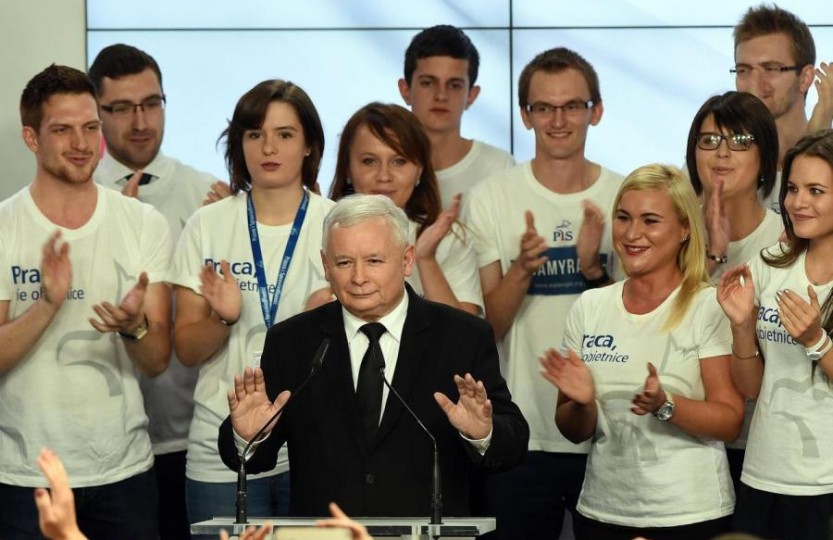
Although occasionally described in the media as “far right”, PiS has so far remained within the boundaries of the mainstream political spectrum. It is committed to fundamental political freedoms, albeit within a more majoritarian framework; it wants to maintain Poland’s EU membership, albeit as part of a looser union with greater national sovereignty; and it accepts the basic tenets of civic pluralism, albeit with a greater role for the state in promoting socially conservative and ‘patriotic’ values, and a more prominent place for the church in public life. The party is a member of the same grouping in the European Parliament as Britain’s Conservatives. Its leading figures would fit comfortably within the US Republican Party (in terms of socio-cultural outlook at least; economically they are to the left of many Democrats). Poland’s actual far right has struggled to make any significant political breakthrough. Some have ascribed this to PiS itself, which has been able to harness the support of all but the most extreme nationalists while itself remaining in the mainstream. Yet there are reasons to worry that this balancing act could break down.
The first is PiS’s fragile majority. Although the party won an impressive victory at October’s election – becoming the first in Polish history to (narrowly) win enough seats to govern alone – this success owed less to any great wave of enthusiasm than it did to disillusionment with the previous government, which had been in power for an unprecedented eight years, and a lack of credible alternatives. This left PiS as almost the default option for many weary swing voters. As such, outside its core base (which is admittedly large, but also ageing), the party’s support is brittle. Recent polls suggest that it has already lost between a fifth and a quarter of the backing it received in the election. The danger is that many of these defectors – or others among the 50% of Poles who did not even vote – will turn to parties outside the mainstream.
This risk has been illustrated by the dramatic political rise of Paweł Kukiz, a former rock star whose platform is founded on strident opposition to the political establishment. Not even formally involved in national politics at the start of last year, by May Kukiz had finished third in the presidential election, with 21% of the vote, and by October his party had become the third largest in parliament. Kukiz’s movement took an increasingly right-wing, nationalist character as the year progressed, culminating in his decision to ally with an unambiguously far-right group, the National Movement (RN). Five RN candidates were elected as MPs on Kukiz’s ticket, including their leader Robert Winnicki. In November, Winnicki welcomed to the Polish parliament a delegation containing Italian neofascist Roberto Fiore and representatives of Jobbik. In a recently released secret recording, Kukiz himself is heard complaining that RN’s leaders are “psychopaths who say that Jews should be killed, black people shot” – yet they remain within his alliance.
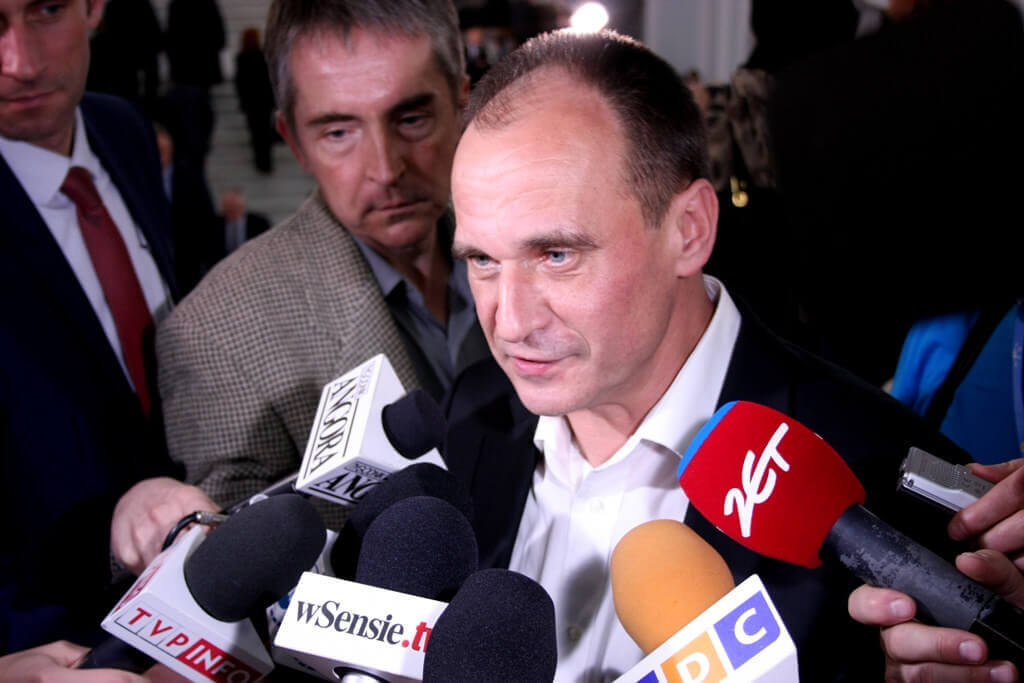
Since the election, Kukiz’s efforts have been directed towards gathering signatures for a petition to call a referendum aimed at preventing the arrival of Muslim refugees, which one of the petition organizers declares would amount to “suicide on a cultural level”. Initially supportive of the new government, Kukiz has increasingly turned against it, condemning PiS for perpetuating Poland’s “partiocracy” of “cronyism and nepotism”. Such rhetoric chimes with many Poles, particularly the young: at the parliamentary election, 37% of voters under the age of 30 supported Kukiz or KORWiN, a conservative-libertarian party whose leader openly questions the merits of democracy and whose election campaign was centred on opposition to Muslim refugees.
Threatening to exacerbate this trend is the fact that PiS’s economic policies – which are largely aimed at helping families and older voters – are unlikely to resolve young Poles’ concerns. A recent poll found that 78% of under-25s and 66% of those aged 25-34 were dissatisfied with the performance of the new government, representing a huge rise since January, when the figures were 31% and 36% respectively. There is also a danger that the government’s spendthrift polices will swell the deficit and induce either sudden spending cuts or an economic crisis, either of which could have worrying political repercussions. The OECD warns that most of PiS’s spending pledges are unfunded, risking pushing Poland over the EU’s budget-deficit limit. In January, Standard and Poor’s downgraded Poland’s credit rating, explicitly citing the new government’s policies; Moody’s appears likely to follow suit this week. Even the finance minister initially refused to sign off on his own government’s flagship child-benefit policy due to its bloated costs.
PiS promotes a conspiratorial mindset, presenting an image of Poland as under threat from shadowy “post-communist” elites at home, as well as foreign powers conniving to keep the country weak and divided.
A further concern is the manner in which PiS is poisoning Poland’s political discourse. It has fostered an us-versus-them mentality, bifurcating society into opposing categories: the patriotic, God-fearing supporters of its own conservative agenda; and “Poles of the worst sort”, who “want to keep Poland as low as possible” and as a “colony of other powers”, in the words of party leader Jarosław Kaczyński. As the latter suggests, PiS promotes a conspiratorial mindset, presenting an image of Poland as under threat from shadowy “post-communist” elites at home, as well as foreign powers conniving to keep the country weak and divided. Kaczyński has hinted that the organizers of anti-government protests get their orders from the Russian embassy; the defence minister claims that the plane crash which killed former president Lech Kaczynski, Jarosław’s twin brother, was the consequence of Russian “state terrorism”, intended to remove a “leadership that aims to lead Poland to independence”. PiS figures regularly insinuate that the former ruling party, now the main opposition, played some role in causing the crash, or at least covering up the truth afterwards. In such an environment, it is impossible to conduct the kind of good-faith political dialogue that is a necessary part of any properly functioning democracy. If the opposition is treated not as legitimate representatives of a constituency with concerns that should be taken seriously, but as traitors intent on keeping Poland in chains, then any compromise with them would be a capitulation tantamount to treason.
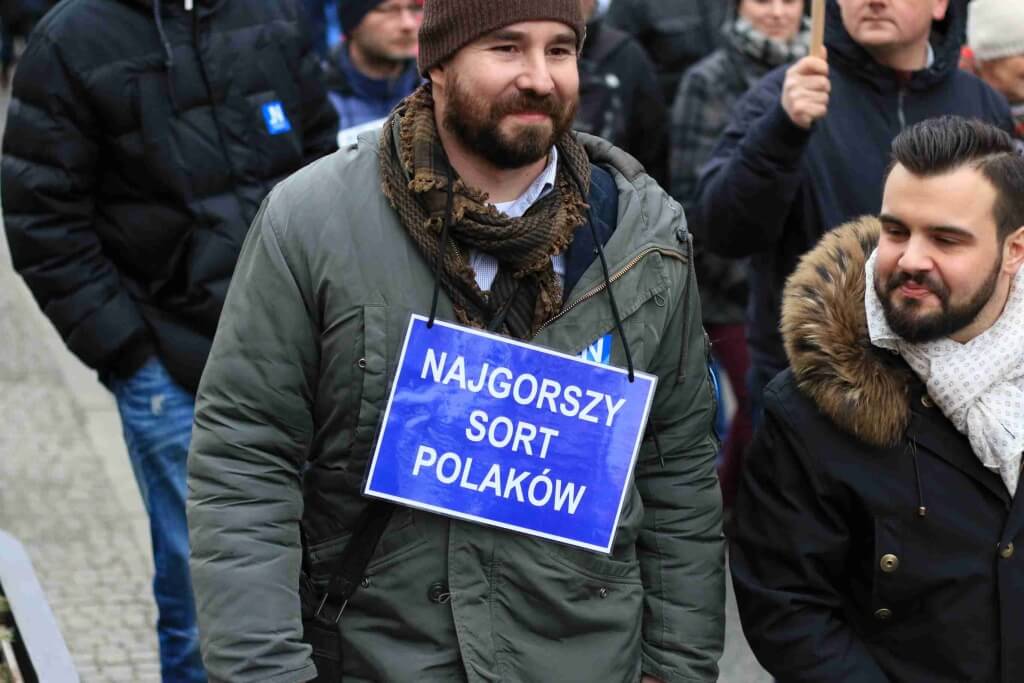
A further troubling development is the government’s role in stoking anti-Muslim sentiment. Perceptions of Islam as a cultural and religious threat have long permeated Poland, yet until recently their expression was largely absent from mainstream political discourse. However, last summer’s European migration crisis forced Polish politicians to respond. While the previous, centrist government attempted to calm fears, PiS stoked and exploited them in the build-up to October’s election. Kaczynski, speaking in parliament in September, attacked the government for agreeing to accept Muslim refugees, warning that they would “not comply with our laws and customs” and instead would attempt to “impose their sensitivities and requirements” in a “very violent and aggressive way”. This could lead, he feared, to parts of Poland living under Sharia law, with Poles “ceasing to be masters of our own country”. The following month, he alleged that these migrants carry diseases that they themselves are immune to, but which are “dangerous” to Europeans. Many saw this as a deliberate allusion to Nazi propaganda in occupied Poland, which accused Jews of spreading disease. Jarosław Gowin, who has since become deputy prime minister, argued that preventing the arrival of Muslims – many of whom “do not accept the principles and values on which Western civilization is based” – was imperative for Poland’s “self-preservation”.
PIS’s move in this direction conforms to the process that scholar of fascism Aristotle Kallis describes as “mainstreaming”, whereby parties such as PiS, seeing how the anti-Muslim arguments of far-right groups are finding “receptive audiences well beyond their electoral constituencies”, choose to appropriate them. This means not just borrowing their language, but adopting their very framing of the issue. Thus Muslim migration is opposed by PiS not merely on the pragmatic grounds of being a potential economic, social and security challenge, but as a mortal threat to the very foundation of Christian European civilization. With taboos thus broken, unabashed Islamophobia has become acceptable on the mainstream right. A recent cover of a news magazine that has close ties to PiS depicted a white woman draped in an EU flag being ravaged by dark-skinned hands alongside the headline ‘Islamic Rape of Europe’. Another prominent centre-right weekly published a cover emblazoned with the call of a KORWiN activist for Poland to “ban Islam before it’s too late”. Since last autumn Poland has also seen a disturbing rise in religiously and racially motivated violence.
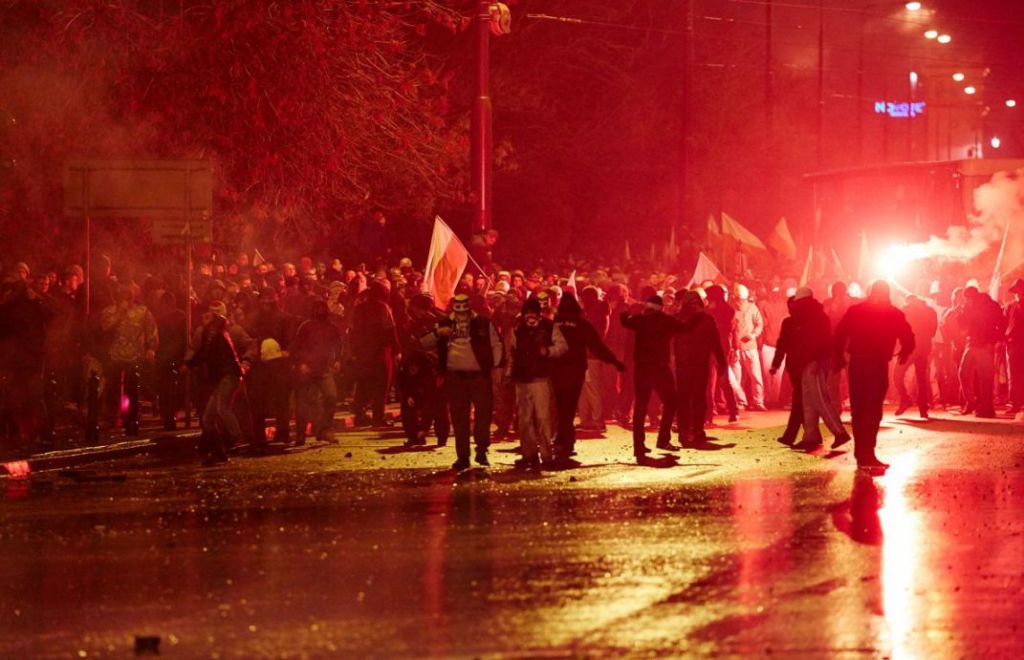
The far right appears energized by the election of a government that shares many of its concerns. It has held a series of marches since the autumn, protesting against Muslim migration, the European Union, and in one case burning an effigy of a Jew. One of the most recent such events began with a mass in Białystok Cathedral, at which the priest told the flag-wielding, black-shirted column from the National Radical Camp (ONR) that Poland was infected by a “cancer” which could only be cured by “uncompromising national-Catholic radicalism”. The local curia quickly claimed that the group’s use of the cathedral resulted from an “administrative oversight” and denounced the event. But Poland’s new political leadership has at times appeared to offer its tacit endorsement to the nationalists. At the Independence Day march in November – an annual event organized by far-right groups such as RN, All-Polish Youth, and ONR – President Andrzej Duda sent a representative to read a letter thanking the 70,000 participants for a “beautiful” event that “builds identity”. (Duda’s predecessor as president not only shunned the event, but founded an alternative, more moderate march.)
Perhaps even more concerning is the possibility that PiS itself, having demonstrated an illiberal streak in its treatment of state institutions and a willingness to appropriate the discourse of the far right, may drift further towards, and perhaps beyond, the boundaries of the political mainstream.
Taken together, these trends offer a worrying vision of Poland’s future direction. Weakened democratic institutions; increased government control over the media, judiciary, and police (including expanded surveillance powers); new “territorial defence” militias (with the defence ministry suggesting there would be no problem if ONR wanted to form one); centrist and left-wing political opposition portrayed as enemies of the nation; a conspiratorial sense of victimization at the hands of shadowy domestic forces and hostile foreign powers; a fear of the encroaching Muslim other, whose arrival threatens national destruction; a historical policy that promotes a one-sided version of Poland’s past designed to fortify patriotic sentiment (and threatens prison sentences for those who write things that are “contrary to the facts”); an angry, neglected youth and growing anti-establishment sentiment – such conditions are rife for exploitation by the far right.
By creating this environment, but itself failing to resolve the socio-economic issues that have caused popular frustration, PiS risks paving the way for more extreme alternatives. This scenario could easily be hastened by various potential crises: an escalation of hostilities in neighbouring Ukraine or other forms of Russian aggression; the repercussions of a Brexit (which, as well as rattling the EU, could close off a safety valve for young Polish emigrants); a failure to manage the flow of migrants into Europe; further Islamic terrorist attacks; a domestic or European economic crisis.
In such circumstances, it is entirely feasible to imagine a scenario in which, at the next elections, PiS remains the largest party but loses its majority, leading to a coalition with a resurgent party of the far right. This is what happened in 2005, when PiS invited the League of Polish Families to join the government. Perhaps even more concerning is the possibility that PiS itself, having demonstrated an illiberal streak in its treatment of state institutions and a willingness to appropriate the discourse of the far right, may drift further towards, and perhaps beyond, the boundaries of the political mainstream.
![Political Critique [DISCONTINUED]](http://politicalcritique.org/wp-content/uploads/2015/09/Political-Critique-LOGO.png)
![Political Critique [DISCONTINUED]](http://politicalcritique.org/wp-content/uploads/2015/09/Political-Critique-LOGO-2.png)
